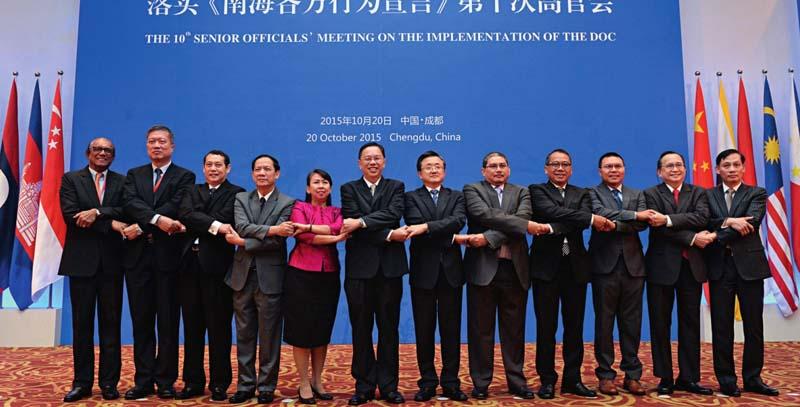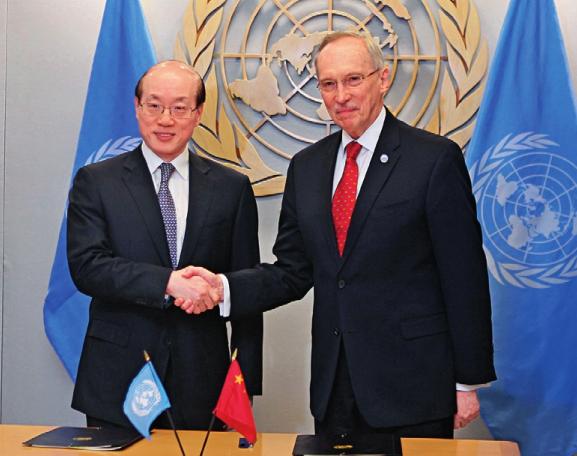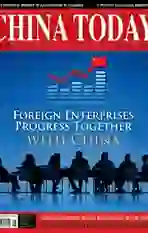China Is a Willing and Constructive Reformer of International Order
2016-06-29ByKOULIYAN
By KOU LIYAN
THERE are the clans of Noahs sons, according to their lines of descent, within their nations. From these nations spread out over the earth after the flood,” is how Genesis concludes the story of Noahs ark. Many countries have similar legends of how early ancestors, when threatened by disasters, dispersed to places around the world, and how after this parting of the ways, as told in the story of the Tower of Babel, there occurred huge differences of language and lifestyle.
Chinas equivalent is the legend of “the big locust tree” from more than 700 years ago, when the emperor ordered the people of Shanxi to leave their home province and settle in other areas. The migrants first went to Hongtong County of Shanxi and assembled under a big locust tree. It was from there that they set out. That “big locust tree” has since been a common memory of Shanxi migrants and their descendants. Today people of more than 1,000 family names claim ancestry to that gathering under the “big locust tree.”
Humanity throughout the globe originated in a handful of early human habitations. As the population swelled, gaps among people widened. But even after technology facilitated traveling and communications, so making the world a “village,” there was no recurrence of the harmony our ancestors knew. If our living and working together can spawn only confusion and conflicts, this is clearly as much a tragedy for us as it would have been for our ancestors. Humanity has a deep-rooted longing for order and harmony.
Defender of International Order
In recent years, Chinas rapid development and more assertive foreign policy stance has caused growing con-cern about the countrys potential impact on the international order. The challenge that this emerging country apparently presents to established world powers presages an imminent hegemonic confrontation.
China has a tradition of respecting order. The Analects tells of how enraged Confucius became upon hearing that a minister had organized a dance at his house for 64 people, eight rows by eight columns. According to state protocol, such an event could be held exclusively in the court of the highest ruler, as in a ministers house a dance for no more than 16 persons, four rows by four columns, was permitted. Why was Confucius so infuriated by such an ostensibly trivial matter? He believed that flouting dance protocol would cause a ripple effect, whereby commoners would challenge the rules of society and officials would despise their lords and kings, so leading to the eventual collapse of the entire social order.
The high value placed on order has had profound influence on Chinese thinking. People from overseas who have had dealings in China, whether with officials or businessmen, cannot but be aware of its omnifarious“orders” in every field. In applying this mode of thought to international affairs, the Chinese always lament todays disparity among nations as regards the observation of rules. When dealing with international and regional hotspots, China unquestioningly supports international organizations like the UN, IMF, and WTO, and upholds their authority. Other more developed nations, however, tend to take shortcuts and act as they please, or with their cliques.
Certain countries have recently been hyping the South China Sea issue, accusing China of challenging the international order. They distort the facts, either because of incomplete information or out of a desire to provoke a geopolitical struggle. Chinas rights and interests in the South China Sea islands and adjacent waters are based on solid historical facts. The status quo is that certain countries have laid claims to 42 islands and reefs. China nevertheless advocates peaceful negotiation via “dual-track thinking.” This, on the one hand, involves addressing disputes with the parties directly involved through friendly negotiations and peaceful settlements, and on the other, China and ASEAN countries joint maintenance of peace and stability in the region.
In other words, “dual-track thinking” means that direct stakeholders sit down and talk with a view to creating rules specifically in areas where there are none. For this reason, China actively promoted relevant partiesnegotiation of the “Code of Conduct in South China Sea,”but has declined to submit the issue for international arbitration while channels of negotiation still remain. The latter, from Chinas point of view, is not the right way to make rules, as the participation of even more parties will complicate matters. Transposing the issue to a larger stage will cause a proliferation of contradictions rather than evolvement of rules.
China seeks order on the South China Sea issue, but not at the expense of the countrys legitimate rights. The reclamation and reinforcing projects on certain islands and reefs, along with the building of lighthouses, runways and other facilities, are normal developments by a sovereign state. They can also provide convenience and support to relevant countries free navigation in the South China Sea. None impairs freedom of navigation in the South China Sea or runs counter to Chinas policy of safeguarding international order.
Reform of International Order Expected
Maintaining order does not mean clinging to any particular one. Respect for reform is also part of our tradition. Confucius taught his disciples according to the Book of Changes, a classic devoted to the principle of change. To understand the reverence for both maintenance and change of order, it might help to look back on the development of Chinese society and culture.
Chinese culture took shape and developed during the long agrarian age. In ancient times, peoples collaboration on irrigation and large-scale planting of sub-divided fields was essential. Consequently rules that accumulated over ages of interpersonal communication became sacrosanct; the consequences otherwise could be crop failure, famine or isolation. On the other hand, climatic factors vital to farming, which often resulted in drought, floods and river diversions, were volatile beyond expectation. People hence had to be ready to adapt to new situations at all times. In other words, the Chinese have simultaneously internalized the need to observe rules and the ability to adapt to realities.
Bearing this in mind helps understanding of the Chinese view of the international order. In general, Chinese people are willing to adapt to a new environment and comply with the accompanying rules. When tens of millions of young people migrated from the countryside to urban areas, they changed their ways of eating, dressing and speaking rapidly. Another salient example is that of Chinese doing business or traveling overseas, a growing phenomenon in the last few years. After initial embarrassments and discomforts as newcomers, they have quickly adapted to unfamiliar environments and customs, and began to get along with locals. This is evident in the remarkable growth in Chinese corporations social contributions and tourists civic awareness.
Therefore, it is best to regard China as an adapter to rather than a challenger of world relations. One thing to bear in mind is that only in the last few years have Chinese people begun to travel abroad in large numbers, and that the nation is still learning new things. Rather than blaming a “latecomer” for overlooking rules, it is more realistic to acknowledge Chinas willingness to adapt and change, and the fact that the Chinese people learn rapidly and well.
While adapting to the outer world, however, China holds that the international order should also change in tandem with reality. The world has a system of order, but it is not a fair one; international society may be called dynamic, but it nevertheless lacks vibrancy; nations com-municate with each other, but not deeply enough. Movements ranging from Occupy Wall Street to continuous protests throughout the world reflect general dissatisfaction with the current order. In this respect, therefore, China is not alone in advocating reform of the international order. The fact is everyone wants reform.
China and the world at large believe that human beings deserve a “better” order. A “better” system should encompass a clear order that everyone strictly follows, that benefits all but remains flexible to change, and that guarantees untrammeled exchanges among parties with a view to mutual trust and cooperation.
Reforms in both China and the World at Large
China is a constructive reformer within the international order. It calls for maintenance of the current system but in a better direction. It holds that the current order should not be overturned but rather that we cannot stand still. Reforming the international order should be a symphony, rather than a solo or work of unison, played in harmony by all nations, based on good will and consensus, while also taking into account different self-positioning. Therefore, Chinas plan involves reforms both to itself and the world in an endeavor to create a better future.
First, China will deepen domestic reforms. Traditional Chinese culture emphasizes self-improvement before trying to benefit others. As the classic work of Confucianism, the Book of Rites, states, first cultivate oneself, and only then pursue family harmony, capable political administration, and finally world peace. This process underlines introspection and self-actualization. It is a far-reaching idea that influences the thinking of enterprises and governments even today.
In the recently unveiled 13th Five-Year Plan, the Chinese government vowed to realize supply-side structural reform by cutting overcapacity and excess inventory, deleveraging, reducing costs, and strengthening weak links. Each goal constitutes carrying out “surgery” on the current economy. It takes great courage and accountability to complete these tasks, but China will nevertheless forge ahead, not least out of the desire to create a more rational international order. With this in mind, and as the second largest economy, China is determined to become a healthy, strong and sustainable contributor to the world.
Second, China calls for joint global efforts towards reform of the international order which it advocates by virtue of its own reforms. It champions these efforts by putting forward proposals and promoting collaborations. The solutions China proposes in this regard are aimed at building a new type of international relationship, with cooperation and win-win at its core. They represent a bid to build a community of shared future: to establish partnerships on the basis of equality and mutual respect; build a security pattern featuring fairness, joint construction and shared benefits; seek open, innovative, inclusive and reciprocal development prospects; promote exchanges and mutual learning among civilizations; and build an international environment that respects nature and green development.
Third, China proactively provides public goods for reform of the international order, both tangible and intangible. China is aware that a fair and reasonable new order will not arise simply from whimsy or empty talk. In recent years, the country has supplied more public goods, such as the Belt and Road Initiative, Asian Infrastructure Investment Bank, China-UN Peace and Development Fund, and an assistance fund for South-South cooperation, in a drive to promote greater equilibrium and democracy in international relations. As regards intangible products, China has, through the United Nations, APEC, BRICS, G20, East Asian leaders meetings, and the Boao Forum for Asia, called upon international society to strengthen cooperation and form a greater consensus on a better international order.
In the process of pursuing an ideal world, China has laid great store by time-honored ideas that can be best defined by the core thoughts of another great philosopher, Laozi, whereby all things eventually return to their source, and changes ultimately accord with nature. When relating the reality of the global village to the “big locust tree” story, we see that Chinas proposal for international order is an effort to revert to the harmonious community of common destiny that human beings once enjoyed.
